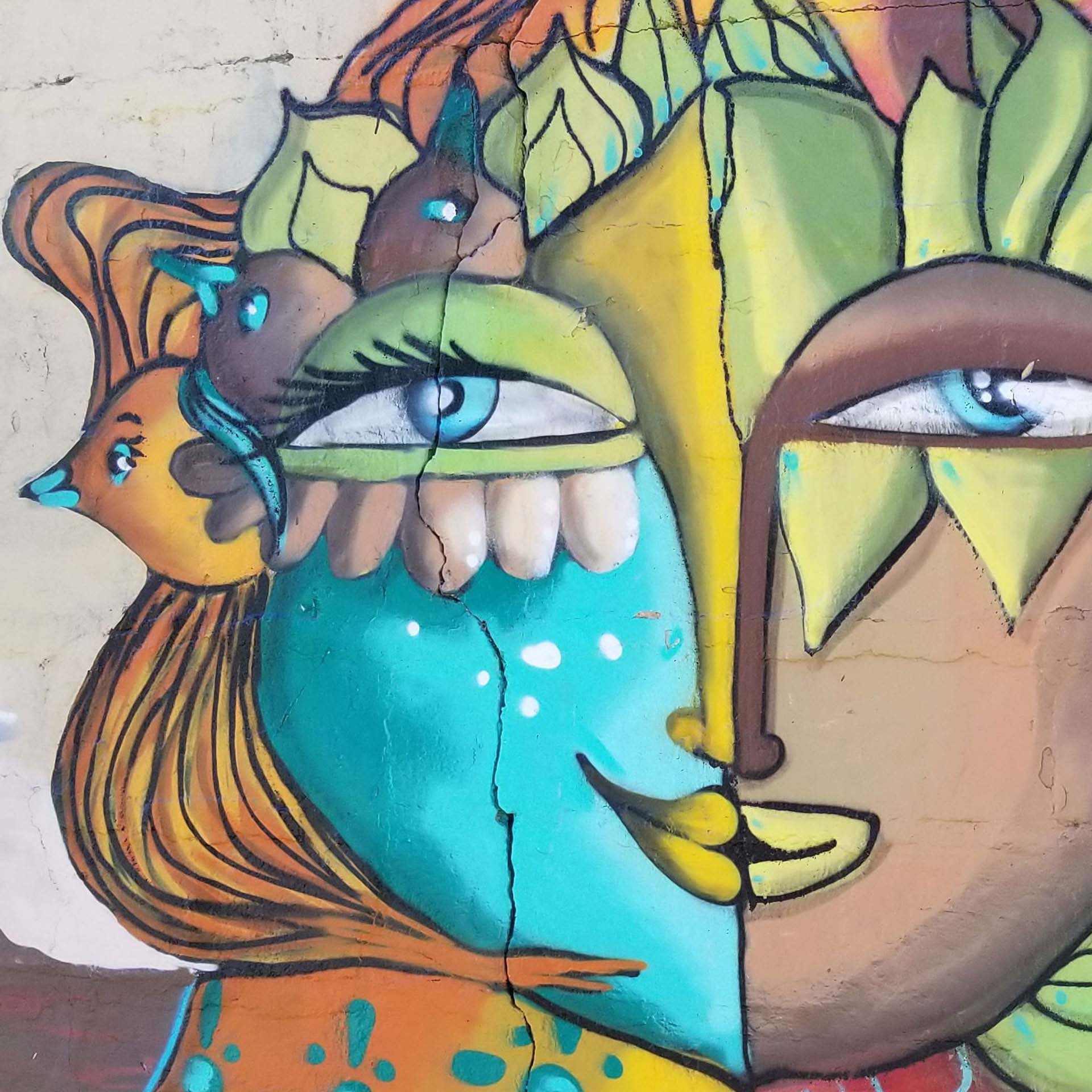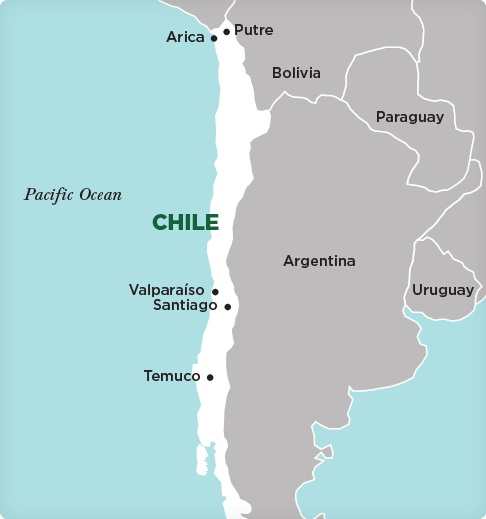Credits
16
Prerequisites
3 semesters Spanish
Language of Study
Spanish
Courses taught in
Spanish
Dates
Feb 18 – Jun 2
Program Countries
Chile
Program Base
Valparaiso
Critical Global Issue of Study
Identity & Human Resilience
Development & Inequality

Explore Chile’s recent political and social history and how Chileans are reconciling with the past to create a more equitable and culturally inclusive society.
16
3 semesters Spanish
Spanish
Spanish
Feb 18 – Jun 2
Chile
Valparaiso
Identity & Human Resilience
Development & Inequality
Chile has undergone monumental political, economic, and social changes over the past four decades—including transitioning away from a 17-year dictatorship. Studying in Chile, you will explore how Chileans today are building a more equitable and inclusive nation and you will become part of a larger intercultural movement yourself. You’ll witness the struggle for justice and reconciliation related to the military regime’s human rights violations, and you will have the opportunity to complete an internship or conduct independent research.
During your excursions, you will spend two weeks with Mapuche and Aymara communities to understand the longstanding challenges Chile’s indigenous peoples face. In addition, you’ll work on a community project with an NGO and learn about the development strategies local communities are using to confront their unique challenges.
You will also receive intensive Spanish language instruction and develop the skills to discuss sociocultural issues through classroom learning, cultural immersion, homestays, and excursions.
Previous college-level coursework in the social sciences, sociology, anthropology, gender, and/or cultural studies. Three recent semesters of college-level Spanish or the equivalent and the ability to follow coursework in Spanish, as assessed by SIT.


You will have three local, field-based excursions in Valparaíso and nearby Santiago, which will help you learn about Chilean cultural identity, social justice movements, and human rights struggles. Highlights include visits to Chile’s National Congress, Villa Grimaldi prison camp, social organizations, and NGOs and think tanks. You’ll also visit a local fishing village and artisan workshops to experience Chile’s culture and talk to people about vital aspects of Chile’s recent history and current realities.
On your ten-day excursion to Temuco, you’ll learn about the Mapuche, the largest group of indigenous people in Chile, and their complex relationship with Chile’s history, government, and culture. You will consider the challenges facing the Mapuche and you will live with a Mapuche family to understand development issues from their perspective. You will also travel within the region, from the Pacific coast to the Andean mountains, learning about local cultural and economic survival initiatives.
On a one-week excursion to Arica and Putre in northernmost Chile, you will visit urban and rural Aymara communities, afro-descendent communities, an intercultural school, and organizations working with migrants from Peru and Bolivia. Through seminars, workshops, and intercultural meetings, you will explore Aymara history, worldview, daily life, traditional agriculture, and various cultural expressions such as oral traditions, music, textiles, and food.
Please note that SIT will make every effort to maintain its programs as described. To respond to emergent situations, however, SIT may have to change or cancel programs.
Upon successful completion of the program, students will be able to:
The following syllabi are representative of this program. Because courses develop and change over time to take advantage of dynamic learning opportunities, actual course content will vary from term to term.
The syllabi can be useful for students, faculty, and study abroad offices in assessing credit transfer. Read more about credit transfer.
Culture and Society in Contemporary Chile – syllabus
(LACB3000 / 3 credits)
This course introduces students to societal and cultural changes in Chile by reviewing the military dictatorship and the post-dictatorial political order. Students analyze both old and new forms of subjectivity and sociocultural practice, which have emerged as a consequence of and in response to hegemonic political and economic discourses. Students will analyze cultural values and antagonisms, considering issues of exclusion and marginalization in terms of class, gender, sexuality, youth, and ethnicity. Students also consider the cultural influence and impact of political violence in the production of subjectivity and culture during the dictatorship. All coursework is conducted in Spanish.
Socioeconomic Development in Chile – syllabus
(LACB3005 / 3 credits)
Chile has undergone a number of drastic and diverse economic and political changes since the military coup of 1973. After the end of the dictatorship in 1989, economic growth and political stability in Chile were hailed by the international business community and economic agencies as a model to follow for the rest of Latin America and the world. In this course, students will critically question this process by looking at the impact the Chilean political system and the neoliberal model of economic development have had on the standards of living and quality of life of most Chileans. The course addresses political issues related to human rights violations, the character of the political constitution, labor relations in Chile, and the institutional continuities and discontinuities between dictatorship and democracy. All coursework is conducted in Spanish.
Spanish for Social and Cultural Studies I – syllabus
(SPAN2503 / 3 credits)
Spanish for Social and Cultural Studies II – syllabus
(SPAN3003 / 3 credits)
Spanish for Social and Cultural Studies III – syllabus
(SPAN3503 / 3 credits)
In this course, students hone their speaking, reading, and writing skills through classroom and field instruction. They practice reading cultural studies literature as they learn the theoretical terms and local expressions needed to discuss socio-cultural issues, to conduct field research, and to interact in settings related to the program themes. Students are placed in small classes based on an in-country evaluation that tests both written and oral proficiency.
Research Methods and Ethics – syllabus
(ANTH3500 / 3 credits)
This research methods course is designed to prepare students for an Independent Study Project or internship. Through lectures, reading, and field activities, students study and practice basic social science methods. They examine the ethical issues surrounding field research related to the program themes and are guided through the World Learning / SIT Human Subjects Review process, which forms a core component of the course. By the end of the course, students will have chosen a research topic or internship placement, selected appropriate methods, and written a solid proposal for an Independent Study Project or internship related to the program themes. All coursework is conducted in Spanish.
Choose one of the following two courses.
Independent Study Project
Independent Study Project – syllabus
(ISPR3000 / 4 credits)
Conducted in Valparaíso or in another approved location appropriate to the project, the Independent Study Project offers students the opportunity to conduct field research on a topic of their choice within the program’s thematic parameters. The project integrates learning from the various components of the program and culminates in a final presentation and formal research paper.
Sample ISP topic areas:
Browse this program’s Independent Study Projects / undergraduate research.
OR
Internship and Seminar
Internship and Seminar – syllabus
(ITRN3000 / 4 credits)
The internship consists of a four-week period with a local community organization, research organization, or NGO. Students complete an internship and submit a paper in which they process their learning experience on the job, analyze an issue important to the organization, and/or design a socially responsible solution to a problem identified by the organization. International internships offer students an opportunity to combine an experience abroad, with all the benefits of intercultural and foreign language learning, with a pre-professional experience, acquiring 21st Century skills such as an ability to flourish in a diverse and multinational workplace. An internship advisor/mentor appropriate to the organization/institution is also selected. Mentors are usually host country research professionals. In conducting their internship, students use the concepts and skills of field-based learning. The internship will be conducted in Spanish.
Topics and placements may vary according to the availability of each institution.
Examples of internships:


Students on this program represent a wide variety of colleges, universities, and majors. Many of them have gone on to pursue academic or professional paths that connect back to their experience abroad with SIT. Recent positions held by alumni of this program include:
Production software engineer at MaxPoint Interactive, Raleigh, NC
Project manager at an electronic health record software company, Madison, WI
Women’s programs coordinator at the Mexican Association for Urban and Rural Transformation, Oaxaca, Mexico
Delivery room nurse at University of Rochester Medical Center, Rochester, NY
Staff assistant in the United States Senate, Washington, DC
Program coordinator at FoodCorps, Washington, DC


SIT Study Abroad is committed to ensuring that international education is within reach for all students. We believe in the transformative power of immersive, intercultural experiences and are dedicated to supporting students in their educational journey.
See Full Breakdown
A critical step in preparing for your study abroad program is planning how you will maintain your health and wellbeing. Please review the following information carefully and contact [email protected] with any questions or concerns.
View Information